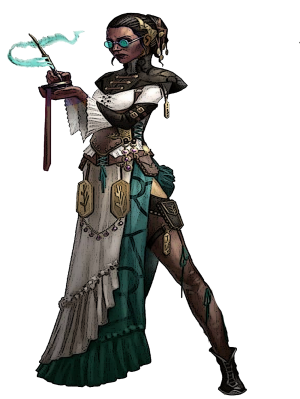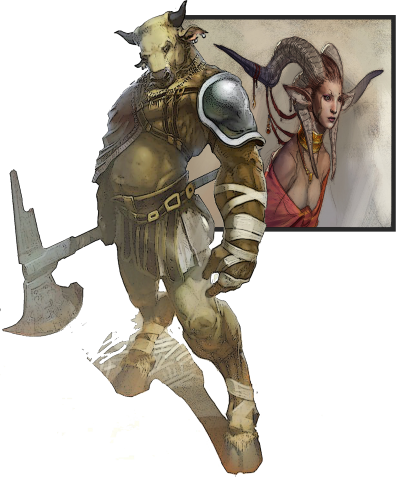D&D 5e: Borderlanders - Characters
Contents
ABILITY SCORES
To determine your character's Ability Scores for this game, either use the standard array or follow the Variant: Customizing Ability Scores section on pp 13 of the PHB, and distribute 27 points between your six ability scores at the costs listed on the Ability Score Point Cost Table (reproduced below with relevant modifiers), with no ability score set higher than 15 before racial adjustment and no ability score set below 8.
| Ability
Score |
Ability Score
Cost |
Ability Score
Modifier |
Ability
Score |
Ability Score
Cost |
Ability Score
Modifier | |||||||
|---|---|---|---|---|---|---|---|---|---|---|---|---|
| 8 | 0 | -1 | 13 | 5 | +1 | |||||||
| 9 | 1 | -1 | 14 | 7 | +2 | |||||||
| 10 | 2 | 0 | 15 | 9 | +2 | |||||||
| 11 | 3 | 0 | 16 | N/A | +3 | |||||||
| 12 | 4 | +1 | 17 | N/A | +3 |
Racial Ability Score Adjustments
The following replaces the standard ability score adjustments for race and subrace. After you have set your base ability scores, increase one ability score of your choice by 2 and another ability score by 1, OR select three different ability scores and increase each by 1.
Language Template Changes
The following setting languages replace language options listed in the PHB:
- Dwarven Trade Tongue replaces Common
- High Dwarven replaces Dwarven
- Gnomes do not have a unique language for their race. Gnomes speak High Dwarven and Dwarven Trade.
- Halflings do not have a unique language for their race. Halflings speak Human and Dwarven Trade.
- Humans speak Human and Dwarven Trade.
- Tieflings speak Outsider (replaces Infernal and includes the ability to communicate with Abyssal, Celestial, and Infernal beings alike) and Dwarven Trade.
- There is no Underdark in this setting. Deep Speech is replaced by Primordial. There is no Undercommon.
- If a race or background grants a bonus language of the player's choice, choose one additional language following the guidelines listed below.
Bonus Language Options
If you get an unspecified bonus language from a racial, class, or background feature, choose from the Mortal or Exotic language options listed below.
- Mortal: Dwarven Trade, High Dwarven, Elvish, Human, Orcish
- Exotic: Draconic, Giantish, Outsider (Abyssal/Celestial/Infernal), Primordial, Sylvan
- Secret: Druidic, Thieve's Cant
Only one exotic language total may be chosen when selecting bonus languages (though if you receive a specific exotic language as a racial or class feature, such as Dragonborn being able to speak Draconic or Warlocks being able to speak the specific language of their Patron, that does not count against your total allowed exotic languages).
There is no limit to exotic language choices when selecting languages for the Linguist feat.
Secret languages are only available via explicit class feature.
Variant Option
This is not a specifically human-centric setting, and the Variant Human as described in the sidebar on pp 31 of the PHB is not an option for this game. Instead, players can opt to discard 2 points of their starting racial ability score adjustment at first level (regardless of race) and instead gain a single feat if they desire.
Feats are also available in lieu of ability score adjustments as you level up.
CHARACTER RACES
All races and subraces from the Player's Handbook are acceptable for this game. Additionally, players may elect to play one of the Min (Horned Ones) or the Firbolg (Planar Half Giants), both of which are described below.
Players opting to play a Human character should also read the description below as it includes features not found in the PHB.
Firbolg
Human
Humans in this game do not conform to any specific meatworld cultural or ethnic type. Please describe those aspects of your character as you like to bring them to life.

Other than Ability Scores and Languages (above), Human characters gain the following additional traits:
- Mundane: As a reaction, you can ignore completely the effects of one spell or spell-like effect of a level equal to or lower than your Proficiency bonus. Once you have used this feature you cannot use it again until you have finished a short or long rest.
- Adaptable: When it would make a difference to do so, you may choose to add the modifier from your highest ability score to your die roll rather than the one called for for the task at hand. You may wait until after you roll the dice (but before the results of the roll have been revealed) to decide. Once you have used this feature, you cannot use it again until after you have finished a short or long rest.
The Min
CHARACTER CLASSES
All classes and subclasses from the PHB and Xanathar's are allowed with the following exceptions or modifications:
- Barbarian - Class Feature Tweaks.
- Totem Warrior Path - In addition to casting Beast Sense and Speak with Animals as rituals, you gain the ability to cast each one once per long rest as an at will ability (no components needed except your totem object as a focus).
- Ancestral Guardian Path - You carry a chip of consecrated bone from one of your tribal ancestors. When you select this path, once per long rest you can consult with your ancestor as if with the Speak with Dead spell. Language is not a barrier. The form of communication is psychic.
- Bard - As Written.
- Cleric - As Written.
- Druid - Wild Shape is a bonus action for Druids and a free action for Circle of the Moon Druids. You can stay in that form for a number of hours equal to your level. Reverting to your normal form is a free action.
- Fighter - As Written.
- Monk - As Written.
- Paladin - All Paladins gain the cantrip Thaumaturgy when they gain the ability to cast spells.
- Ranger - The Gloomstalker is associated with the gloaming and dark wilds in the Feywild rather than subterranean places. All class features remain the same. All Rangers gain the cantrip Druidcraft when they gain the ability to cast spells.
- Rogue - Arcane Trickster can cast Find Familiar as a ritual starting at L3. This does not count against spells known.
- Sorcerer - Wild Magic Origin Sorcerers must roll 1d10 (+ the level of the spell cast) every time they cast a spell. On a result of 10 or higher they trigger a surge of Wild Magic, forcing them to roll on the Wild Surge Table (below). As a bonus action, you may attempt to weave the surge to your advantage, adding or subtracting up to your character's total Sorcerer levels from the naturally rolled table result. Once you use this feature, you must complete a long rest before you can use it again.
- Warlock - Warlocks gain one bonus exotic language (determined by patron). [This does not count against your total for exotic languages].
- Archfey: Sylvan
- Celestial: Outsider
- Fiend: Outsider
- Great Old One: Primordial
- Hexblade: Outsider
- Wizard - If a Wizard casts a cantrip as their action they can cast a second cantrip as a bonus action regardless of the normal casting time for that cantrip (provided they still have a bonus action available to them).
CHARACTER BACKGROUNDS
Instead of using the published backgrounds, please flavor your character's background to fit your specific vision of that character (within the scope of what is reasonable for the setting), using the steps below to flesh out the mechanical benefits of that background.
Languages, Skills, Tools
Typical template is 1 bonus language, 2 bonus skills, and a bonus tool proficiency. But you can mix that up however you like within the following parameters.
- No more than 4 of the above things in total.
- No more than one bonus language can be an exotic language. This is cumulative with any other 'bonus' languages that you might get (such as the half elf or human choice to select one bonus language), so your character should only end up with one exotic language total from player choice language options. Specifically named exotic languages that your character gets elsewhere (such as the dragonborn's ability to speak Draconic) do not count against this total.
- No more than 3 bonus skills from background. [Bonus skills from other sources do not count against this total].
Background Feature
Pick a specific NPC or NPC group you are associated with, such as a mentor or a guild. This NPC or group should give you a specific benefit that you can use in specific situations. You don't have to come up with this specific benefit up front, but the benefit should match the relationship. A mentor might be expected to provide advice or guidance or a recommendation or somesuch. Guild membership on the other hand might provide referrals, supplies, or a place to work, study, or sleep.
[Note: If your class would already provide a group affiliation (such as a monk to a monastery), do not use that as your background feature, unless you are building on that base relationship in some fashion that would conceivably allow a higher level of benefit from the relationship].
Heirloom Item
Finally, choose a single Heirloom Item. This could be something passed down to you from whoever trained you in your craft, a generational family item, or just this strange thing you randomly found (ala Bilbo and the Ring). This item can be just about anything you can wear or carry or otherwise typically have on or about your person.
Ancillary Background Elements
Feel free to include more than just the mechanical bibs and bobs above to flesh out your character. I find different players have a different tolerance for premeditated character structure vs revealing a character as they play, so the steps below are totally optional.
- Traits, Ideals, Flaws, and Bonds: Examples of these can be found in the PHB and online if you want to use this formula to flesh out your character's quirks and motivations.
- Alignment: Please ignore alignment suggestions included in the racial descriptions in the PHB. As a general thing, most races will land on some flavor of neutral with wide variation among individuals, so if you want to pick an alignment for your character, you are not directly or indirectly limited by the listed racial trend.
[Note: This is an aside from building your character's background, but if you are into studying up on the monsters you will be encountering, please also ignore their alignment suggestions included in the MM (or whatever source you are perusing). I typically don't follow them, instead choosing some flavor of neutral as a general rule for type with specific alignments varying widely between individual NPCs of that type].
CHARACTER ADVANCEMENT
Character advancement for this game will be via Milestones rather than by tallying experience. I've just found that model works better for D&D 5E in PBP games.

